Nazification of the Memory War
The rise of Ukraine's new 'memory czar' from the Azov movement
This is Part 1 in a Bandera/Azov Lobby series. The rest will appear behind a paywall on the Bandera Lobby Blog, but if you become a paid subscriber to either Substack, you will get the other complimentary (not automatically but before my next post).
In case you didn’t hear, there’s a new “memory czar” in Ukraine, and his name is Oleksandr Alfyorov. In 2015, he spoke at the founding congress of the neo-Nazi “Russian Center” in Kyiv, a sort of predecessor to the likeminded “Russian Volunteer Corps” that now fights for Ukrainian military intelligence.
Alfyorov, the new head of the Ukrainian government’s Institute of National Memory, is a former press secretary to Andriy Biletsky, the Führer of the Azov movement, and more recently led the ideological department of Biletsky’s openly neo-Nazi 3rd Assault Brigade, which is considered to be one of the most effective units in the Armed Forces of Ukraine.
Ukrainian historian Marta Havryshko pointed out that Alfyorov is someone who “expresses admiration for Hitler.” Furthermore, “He curated his brigade’s museum exhibit in Kyiv, ‘In Steel Storms,’ which glorified the [Ukrainian] Waffen-SS Division Galicia.” The journalist Leonid Ragozin commented, “The first neo-nazi in charge of a government institution in Europe, perhaps.”
Above we see Oleksandr Alfyorov (top right) and Azov ideologist Mykola Kravchenko (top left) at the first congress of the "Russian Center." Below (left to right) is the presidium: Alexey Levkin from the Hitler-worshipping "Wotanjugend" and National-Socialist Black Metal band "M8L8TH" (aka "Hitler's Hammer"); Roman Zheleznov, a good friend of Aleksey Milchakov from the Russian neo-Nazi group "Rusich"; Andrey Kuznetsov, "ideologist of the Russian Insurgent Army" (named after the OUN's Ukrainian Insurgent Army); and Aleksandr Noinets, the Russian editor of the Ukrainian publication "Peter and Mazepa." Note that the fascist "Spayka" symbol of the Russian Center apparently inspired the Russian Volunteer Corps. 20 years ago, Oleksandr Alfyorov was a young “Hetmanite,” or follower of Pavlo Skoropadsky (1873-1945), the German puppet ruler of Ukraine in World War I, who later spent the interwar period cozying up to the Nazis. Skoropadsky had a villa in Wannsee, the Berlin suburb that later hosted the conference dedicated to the “Final Solution.” Skoropadsky and his followers vied with the Organization of Ukrainian Nationalists (OUN) to be the Nazis’ preferred Quislings in Ukraine. The Hetmanites were a smaller, more openly pro-Nazi monarchist movement (supported by Germany in the 1930s) that just barely survived the Cold War in North America. In the 2000s, Alfyorov helped to revive Skoropadsky’s “Union of Hetman-Statesmen” in Ukraine and led its “conservative” youth group.
Alfyorov has reportedly “emphasized that the Ukrainian Institute of National Remembrance needs to expand the chronological framework, which was narrowed during the [Banderite] reforms of 2014–2015.” He is not just thinking of Skoropadsky, but appears to be far more interested in the “thousand-year history” of Ukraine than the Nazi-era “liberation movement.” Given the prevalence of Nazi paganism in the Azov movement, and those fascinated with Ukraine’s supposed “Aryan” roots, it makes you wonder about his relationship to those ideas. When Alfyorov laid out his five priorities for the Ukrainian Institute of National Memory (UINP, Ukrayinsʹkyy instytut natsionalʹnoyi pam'yati), two related to the Thousand-Year History.
3) Strong inclusive national memory. Promote the thousand-year history of the Ukrainian people without looking back at centuries-old Russian narratives. Tell the history of Ukraine without looking to the East, as if Russia had never existed. Strengthen the mutual integration of the memories of Ukraine and Europe. We are not going to Europe — we are returning home.
…
5) A broad contextual framework for history. We will not only talk about the history of Ukraine in the 20th century, but also focus on other periods of Ukrainian history. We will reveal to society the thousand-year-old tradition of Ukrainian statehood and its continuity.
In 2014, Alfyorov became the press secretary to the Azov Regiment (until 2015) and Andriy Biletsky (until 2018). In 2016, he joined the leadership of Biletsky’s “National Corps,” a new Azovite political party. One year later, the Azov movement formed the “National Militia,” which in 2020 relaunched as the paramilitary “Centuria.” As Leonid Ragozin put it, the Azov movement is “built on a very clear ideological foundation - far right politics and adoration of nazi collaborators.”
Alfyorov spoke at a press conference with the neo-Nazi leadership of Centuria in 2018. He might have first gotten involved with the UINP in 2019, when he lectured officers of the Joint Operational Headquarters of the Ukrainian armed forces on “The Role of Religion in the Formation of Ukrainian Statehood.” He thanked Roman Kulyk, a far-right UINP staffer, for the opportunity (more about him next time).
When the National Corps and Centuria formed new Azov units in 2022, which largely consolidated in the 3rd Assault Brigade, Alfyorov became an officer in the Special Operation Forces “Azov-Kyiv” Regiment, and later a “historian lieutenant” in Biletsky’s brigade. Alfyorov was put in charge of the 3rd Assault Brigade’s ideological “humanitarian training group,” or “Khorunza service,” which keeps the unit grounded in Azov’s “very clear ideological foundation.”
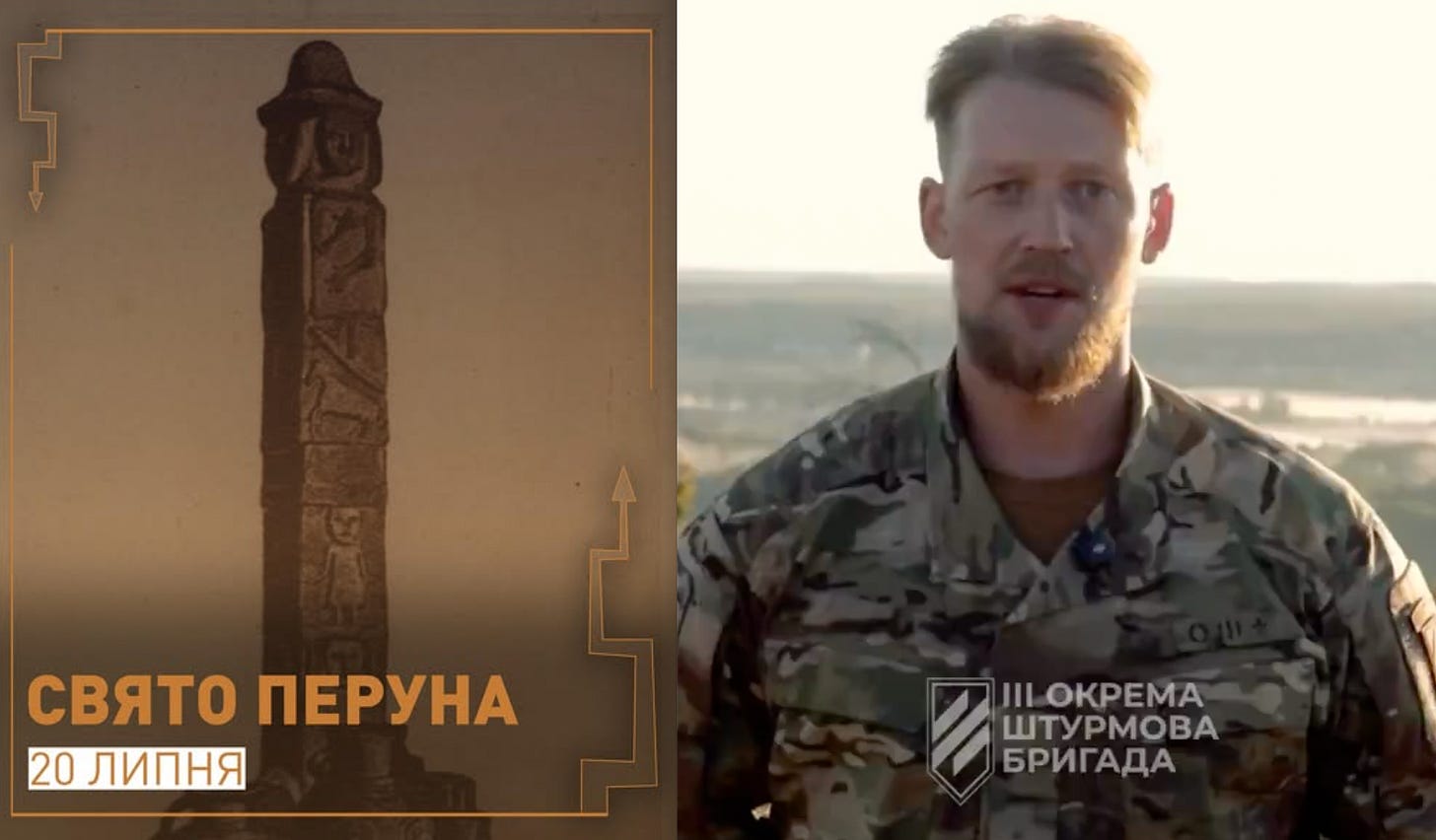
In the spring of 2022, the Kyiv city administration pledged “to get rid of all dubious and false signs of Russian-Ukrainian friendship that affect our cultural consciousness and contribute to the spread of Russian propaganda and falsification of Ukrainian history.” Furthermore, it established a “toponymic commission” or “expert working group” on “De-Russification” led by Azov-Kyiv Regiment officer Oleksandr Alfyorov. The group included “experts” from the UINP and various institutes of the National Academy of Sciences of Ukraine (NASU). Since 2010, Alfyorov worked as a research fellow at the NASU Institute of History, and apparently he joined the commission as its representative.
According to Alfyorov, “the work of the expert commission was undermined, and in some cases even neutralized.” Nevertheless, they identified almost 300 “city objects” to be renamed and offered two options for Ukrainians to choose from, by opening the “Kyiv Digital” app and locating the “vote for derussification” page. (Alfyorov rejects this term, because “there is a hidden reality that Rus’ and rus’ke [what belongs to Rus’] are ours.” He also objects to “decolonization,” because this would “connect us with Africa and Latin America.” So he prefers “de-imperialization.”) As a result, the “Heroes of the Azov Regiment” and “Heroes of Mariupol” streets appeared in the capital, replacing those named after Marshals of the Soviet Union. In 2023, Alfyorov helped to rename Leo Tolstoy Square and its corresponding metro station in central Kyiv to “Ukrainian Heroes Square,” and Leo Tolstoy Street was changed to honor “Hetman Pavlo Skoropadsky.”
It was later in 2023 that the Yaroslav Hunka scandal erupted, when a veteran of the Waffen-SS Galicia Division received standing ovations in Canadian parliament, including from Volodymyr Zelensky. For Alfyorov, the main issue was that Ukraine has not “defined its position regarding the SS ‘Galicia’, and even regarding the UPA,” or the OUN’s Ukrainian Insurgent Army. Meanwhile, the ideological department of the 3rd Assault Brigade presented a photo exhibit at the Museum of Kyiv, which saw Azovite soldiers recreate images of the UPA and Waffen-SS. This year, after Alfyorov became the new UINP director, the political scientist Ivan Katchanovski suggested that this was “Zelensky’s response” to the “Canadian parliament debacle.”
Over a year later, in October 2024, Oleksandr Alfyorov joined a panel discussion on “derussification” with Anton Drobovych, the director of the Ukrainian Institute of National Memory (2019-24), and Roman Lozynskyj, a member of parliament from the Atlanticist “Holos” party. Later that month, the “Khorunza service” of the 3rd Assault Brigade organized a round table event to discuss “real reforms of the humanitarian [ideological] sphere in the military.” Representatives of the Main Directorate of Psychological Support of the Armed Forces of Ukraine, the Psychological Support Staff of the “Khortytsia” Strategic Group, the Communication Department of the Land Forces Command, the Northern Territorial Administration of the National Guard, the National Defense University of Ukraine, and several military units participated. These included the far-right 1st Separate Assault Regiment named after Dmytro Kotsiubaylo, the 49th Assault Battalion “Carpathian Sich,” and the National Guard’s Azov Brigade. They were also joined by Roman Lozynskyj and an unnamed “colonel of a NATO country.”
Days later, Alfyorov spoke at a conference on “democracy during war,” which was organized by the western-funded Reanimation Package of Reforms Coalition in partnership with the German Agency for International Cooperation. In December 2024, shortly before UINP director Anton Drobovych left his post, Alfyorov and others from the ideological department of the 3rd Assault Brigade joined a meeting of the Parliamentary National Security and Defense Committee to further discuss “humanitarian reforms” in the army. We’ll be returning to these events in future installments of this series.
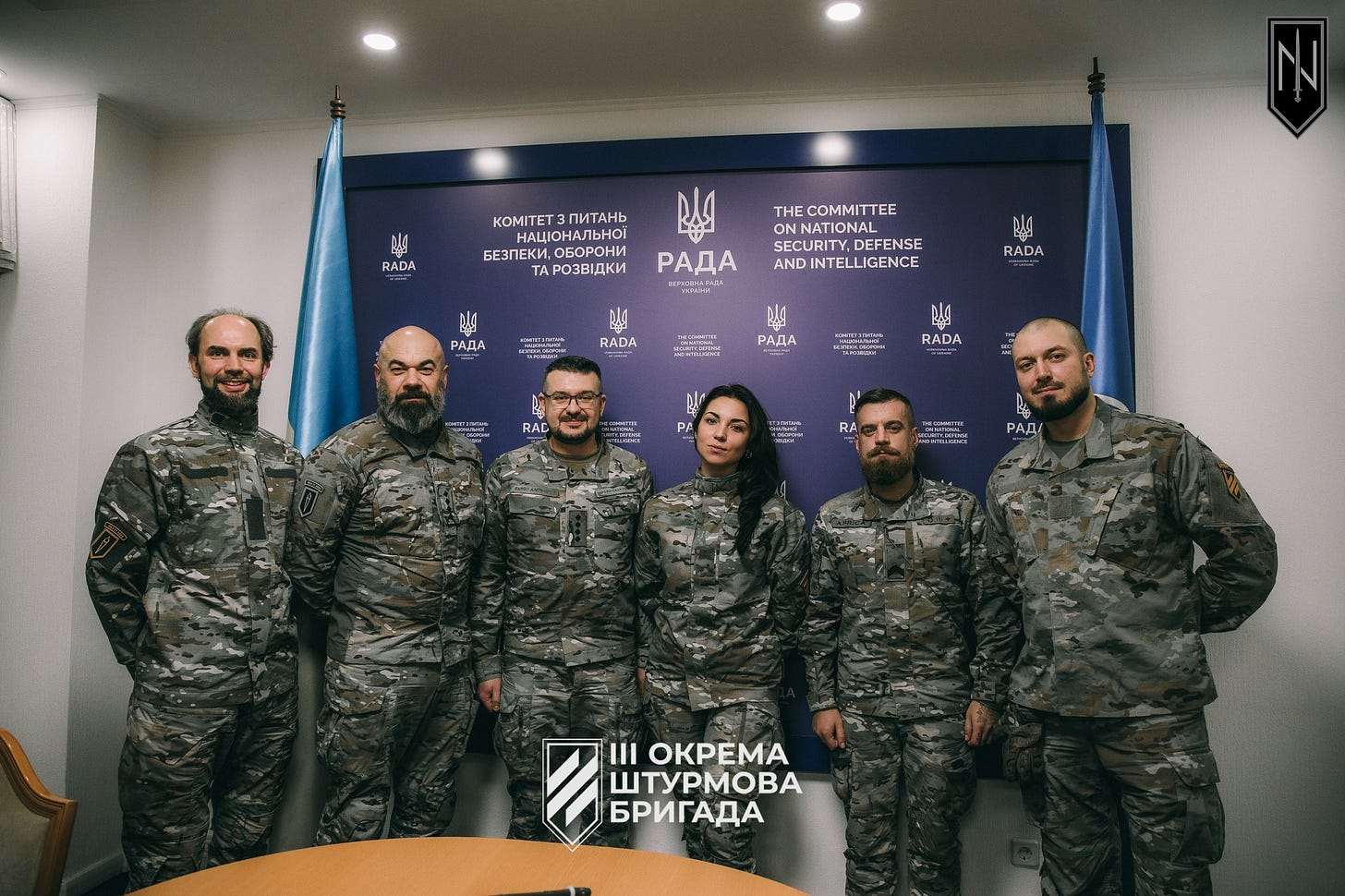
In early 2025, the Foundation of the President of Ukraine for Support of Education, Science and Sports held the First National Forum of Talented Youth, and tapped Oleksandr Alfyorov to award students on behalf of the President of Ukraine Foundation. In March, the Ministry of Defense’s “Army+” application launched “a new course focused on national identity and Ukrainian military history,” featuring Alfyorov, who helped to develop the program. The Azovite ideological officer subsequently appeared in several Army+ videos. Later that spring, before his release from the army to join the UINP, Alfyorov was invited to speak at a panel discussion organized by the National Bank of Ukraine to discuss the imagery on Ukraine’s currency, the hryvnia.
The news broke in late May about Alfyorov’s appointment to lead the UINP. Apparently he wants to rehabilitate not just Nazi collaborators, such as the Hetmanites and OUN-UPA, but Ukrainian soldiers who swore loyalty to Hitler. The historian Marta Havryshko reported in July, “The first bold move by the new head of the Ukrainian Institute of National Memory—Azov veteran Oleksandr Alferov, known for praising Hitler and curating an exhibition glorifying the Waffen-SS Galicia Division—was to rehabilitate Zenon Wrublewsky, a fighter from that very division.” What else might we expect from Alfyorov? Maybe Azovites will increasingly staff the Institute, and perhaps Skorodpadsky will replace Bandera in the UINP pantheon of heroes? Stay tuned for Part 2, in which we will explore Alfyorov’s relationship to the Bandera followers that formerly dominated the UINP (2014-19).


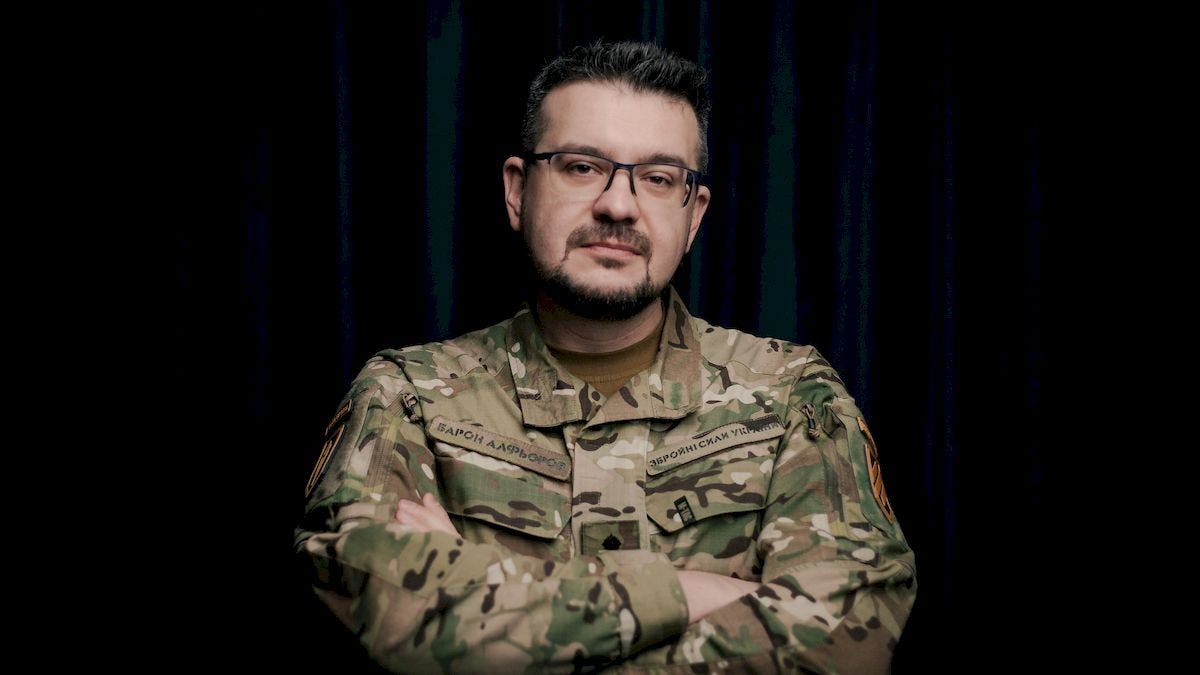
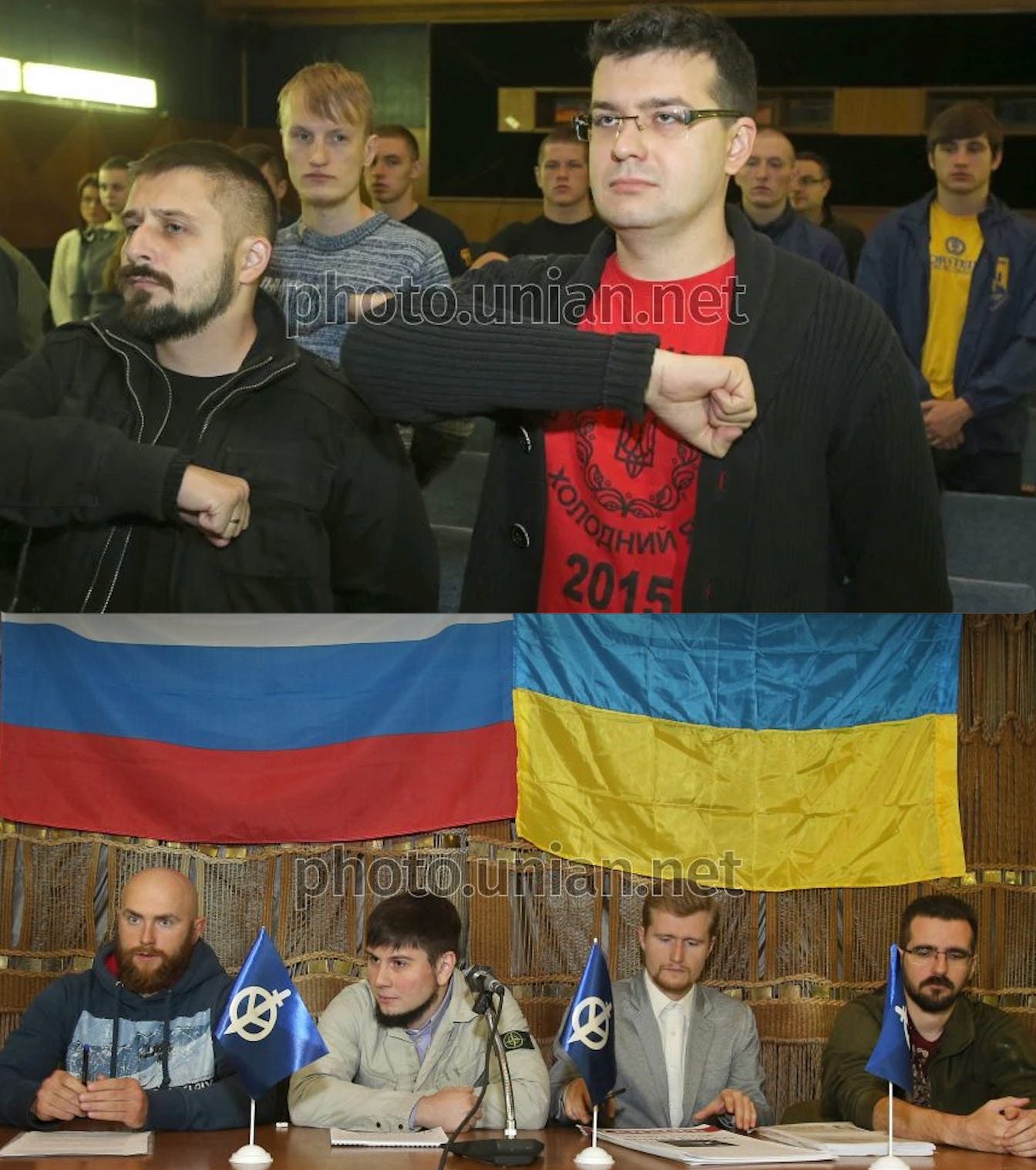
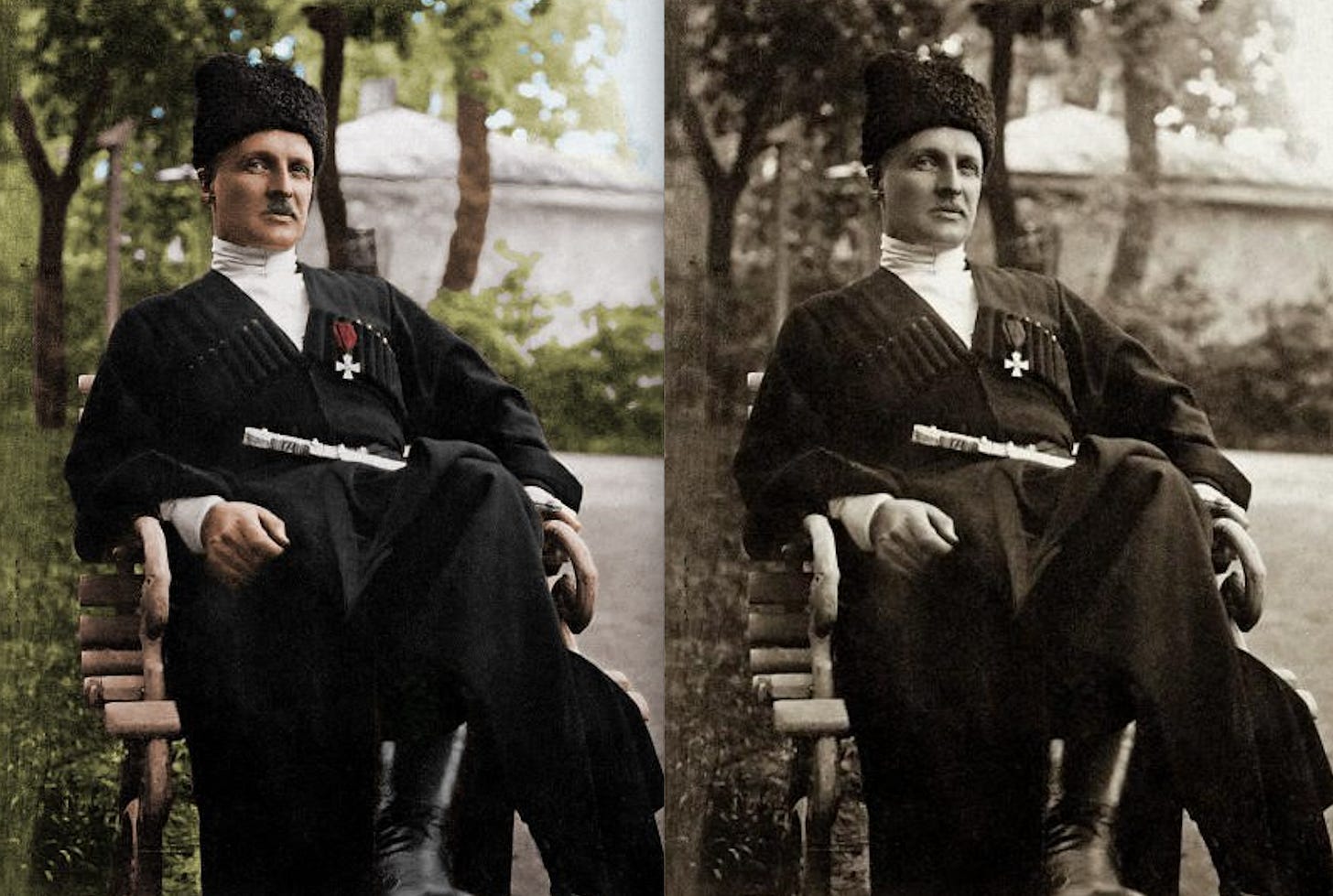
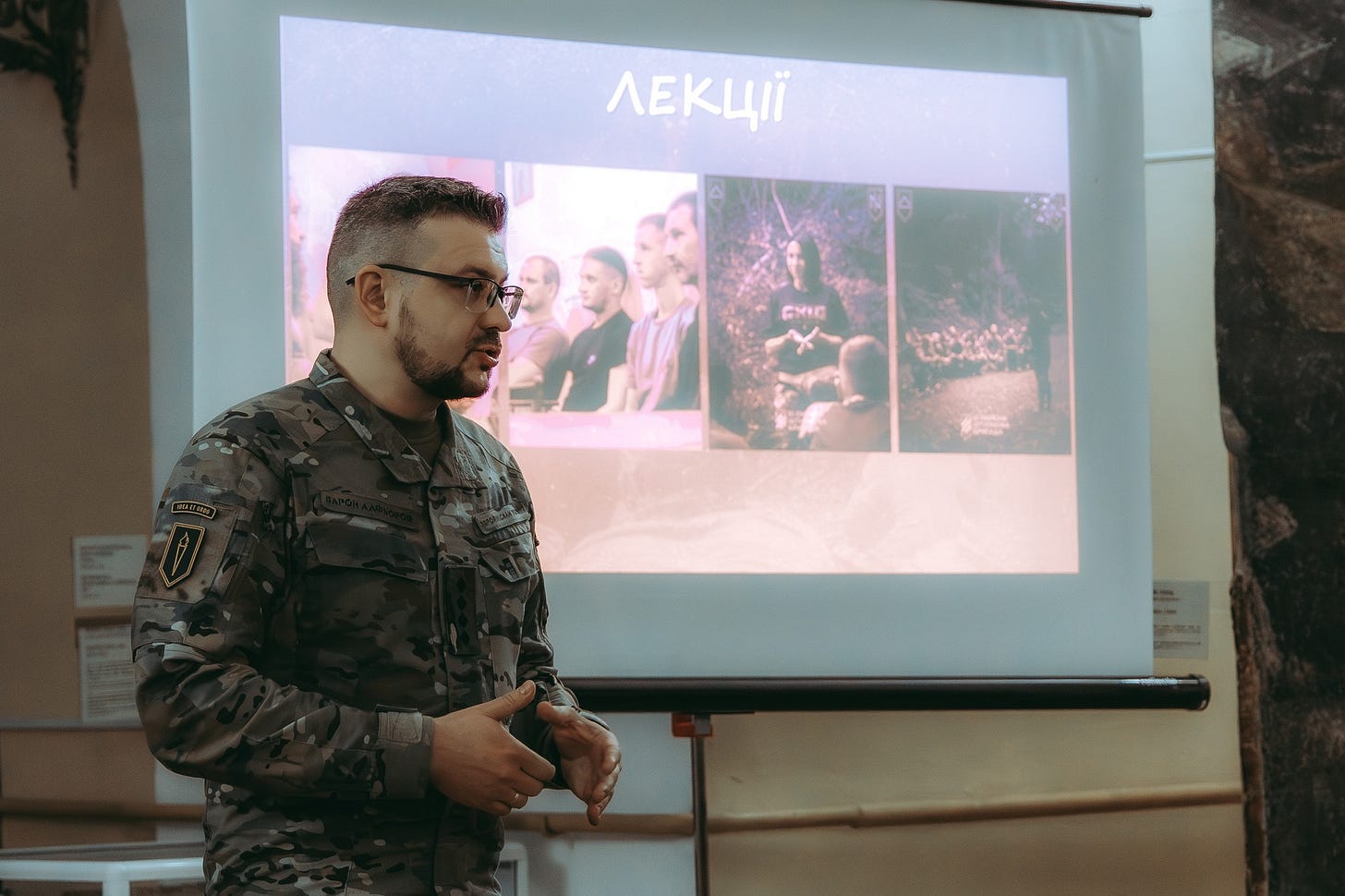

Great work! Alfyorov seems like another delusional fascist! I had wondered whatever happened to the inept Skoropadsky. Now I know (or know more than I did). How you can spend any mental time around these creeps is amazing, as it's something I could never do. You render us all a great service in delineating the fascist world inside Ukraine!